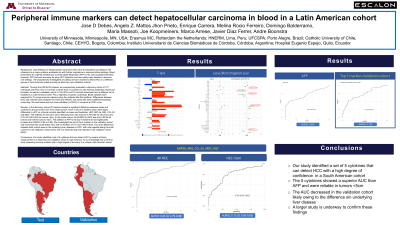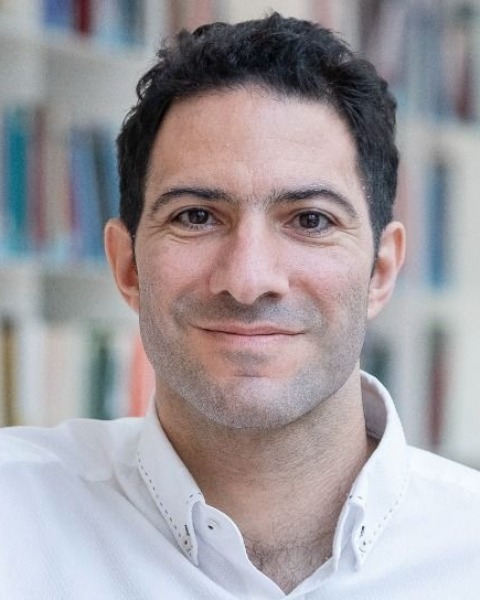Back


Poster Session A - Sunday Afternoon
Category: Liver
A0469 - Peripheral Immune Markers Can Detect Hepatocellular Carcinoma in Blood in a Latin American Cohort
Sunday, October 23, 2022
5:00 PM – 7:00 PM ET
Location: Crown Ballroom

Has Audio

Jose D. Debes, MD, PhD
University of Minnesota
Minneapolis, MN
Presenting Author(s)
Jose D. Debes, MD, PhD1, Angelo Mattos, MD, PhD2, Jhon Prieto, MD3, Enrique Carrera, MD4, Melina Ferreiro, MD5, Domingo Balderramo, MD6, Maria Masotti, PhD1, Joe Koopmeiners, PhD1, Marco Arrese, MD7, Javier Diaz Ferrer, MD8, Andre Boonstra, PhD9
1University of Minnesota, Minneapolis, MN; 2Federal University of Health Sciences of Porto Alegre, Porto Alegre, Rio Grande do Sul, Brazil; 3Cehyd, Bogota, Amazonas, Colombia; 4Universidad San Francisco de Quito, Quito, Pichincha, Ecuador; 5Hospital Clinicas, Buenos Aires, Buenos Aires, Argentina; 6Hospital Privado Universitario de Córdoba, Cordoba, Cordoba, Argentina; 7Pontificia Universidad Católica de Chile, Santiago, Region Metropolitana, Chile; 8Hospital Nacional Edgardo Rebagliati Martins, Lima, Lima, Peru; 9Erasmus University Rotterdam, Rotterdam, Zuid-Holland, Netherlands
Introduction: Late detection of hepatocellular carcinoma (HCC) due to suboptimal surveillance with ultrasound is a major problem worldwide but with further importance in resource-limited settings. Blood biomarkers are urgently needed and currently alpha-fetoprotein (AFP) is the only accepted biomarker. However, AFP has poor accuracy for early HCC detection and has mainly been studied in resource-rich settings. We prospectively investigated circulating immune markers to detect HCC in 2 different groups of Latin American patients acting as discovery and validation cohorts.
Methods: Through the ESCALON network we prospectively evaluated a discovery cohort of 127 individuals with HCC and 113 cirrhotic controls from 3 countries in Latin America (Argentina, Brazil and Ecuador) as well as a validation cohort of 145 HCCs and 75 cirrhotic individuals from a different set of institutions in Latin America (Chile, Peru, Argentina, Ecuador, Colombia). Blood samples were analyzed for 37 unique immune markers using the multiplex Bio-Rad platform. Differences between HCC and cirrhosis were analyzed via t-test and ANOVA, and tuned with lasso coefficient-bootstrap computing. We used leave-one-out cross-validation (LOOCV) to compute an ROC curve.
Results: In the discovery cohort 22 markers showed a significant difference between cases and controls for all size tumors and 15 for those tumors < 5cm. A set of 5 markers which were highly differential in HCC vs cirrhosis controls identified via Lasso and bootstrap: HGF, MIP-3a, MIG, CCL-25, and MDC. The AUROC for this top-5 set in detecting HCC was 0.83 (CI 0.78-0.88) for all tumors and 0.75 (CI 0.66-0.83) for tumors < 5cm. In this same cohort, the AUROC for AFP was only 0.69 for all tumors and 0.66 for tumors < 5cm. The addition of AFP to the top-5 markers did not significantly increase the AUROC (0.83 to 0.85). We investigated the set of top-5 markers in the validation cohort and found that they could detect HCC with an AUROC of 0.73 (CI 0.642-0.810). The main differences between both cohorts were in the underlying liver diseases in HCC, with viral hepatitis being the most common in the validation cohort (42%) and non-alcoholic fatty liver disease in the validation cohort (56%).
Discussion: Our study identified a set of 5 cytokines that can detect HCC by means of blood measurement in a discovery and validation cohort in Latin America. To our knowledge this is the first study assessing immune markers with a high degree of accuracy in a unique Latin American cohort.
Disclosures:
Jose D. Debes, MD, PhD1, Angelo Mattos, MD, PhD2, Jhon Prieto, MD3, Enrique Carrera, MD4, Melina Ferreiro, MD5, Domingo Balderramo, MD6, Maria Masotti, PhD1, Joe Koopmeiners, PhD1, Marco Arrese, MD7, Javier Diaz Ferrer, MD8, Andre Boonstra, PhD9. A0469 - Peripheral Immune Markers Can Detect Hepatocellular Carcinoma in Blood in a Latin American Cohort, ACG 2022 Annual Scientific Meeting Abstracts. Charlotte, NC: American College of Gastroenterology.
1University of Minnesota, Minneapolis, MN; 2Federal University of Health Sciences of Porto Alegre, Porto Alegre, Rio Grande do Sul, Brazil; 3Cehyd, Bogota, Amazonas, Colombia; 4Universidad San Francisco de Quito, Quito, Pichincha, Ecuador; 5Hospital Clinicas, Buenos Aires, Buenos Aires, Argentina; 6Hospital Privado Universitario de Córdoba, Cordoba, Cordoba, Argentina; 7Pontificia Universidad Católica de Chile, Santiago, Region Metropolitana, Chile; 8Hospital Nacional Edgardo Rebagliati Martins, Lima, Lima, Peru; 9Erasmus University Rotterdam, Rotterdam, Zuid-Holland, Netherlands
Introduction: Late detection of hepatocellular carcinoma (HCC) due to suboptimal surveillance with ultrasound is a major problem worldwide but with further importance in resource-limited settings. Blood biomarkers are urgently needed and currently alpha-fetoprotein (AFP) is the only accepted biomarker. However, AFP has poor accuracy for early HCC detection and has mainly been studied in resource-rich settings. We prospectively investigated circulating immune markers to detect HCC in 2 different groups of Latin American patients acting as discovery and validation cohorts.
Methods: Through the ESCALON network we prospectively evaluated a discovery cohort of 127 individuals with HCC and 113 cirrhotic controls from 3 countries in Latin America (Argentina, Brazil and Ecuador) as well as a validation cohort of 145 HCCs and 75 cirrhotic individuals from a different set of institutions in Latin America (Chile, Peru, Argentina, Ecuador, Colombia). Blood samples were analyzed for 37 unique immune markers using the multiplex Bio-Rad platform. Differences between HCC and cirrhosis were analyzed via t-test and ANOVA, and tuned with lasso coefficient-bootstrap computing. We used leave-one-out cross-validation (LOOCV) to compute an ROC curve.
Results: In the discovery cohort 22 markers showed a significant difference between cases and controls for all size tumors and 15 for those tumors < 5cm. A set of 5 markers which were highly differential in HCC vs cirrhosis controls identified via Lasso and bootstrap: HGF, MIP-3a, MIG, CCL-25, and MDC. The AUROC for this top-5 set in detecting HCC was 0.83 (CI 0.78-0.88) for all tumors and 0.75 (CI 0.66-0.83) for tumors < 5cm. In this same cohort, the AUROC for AFP was only 0.69 for all tumors and 0.66 for tumors < 5cm. The addition of AFP to the top-5 markers did not significantly increase the AUROC (0.83 to 0.85). We investigated the set of top-5 markers in the validation cohort and found that they could detect HCC with an AUROC of 0.73 (CI 0.642-0.810). The main differences between both cohorts were in the underlying liver diseases in HCC, with viral hepatitis being the most common in the validation cohort (42%) and non-alcoholic fatty liver disease in the validation cohort (56%).
Discussion: Our study identified a set of 5 cytokines that can detect HCC by means of blood measurement in a discovery and validation cohort in Latin America. To our knowledge this is the first study assessing immune markers with a high degree of accuracy in a unique Latin American cohort.
Disclosures:
Jose Debes indicated no relevant financial relationships.
Angelo Mattos indicated no relevant financial relationships.
Jhon Prieto indicated no relevant financial relationships.
Enrique Carrera indicated no relevant financial relationships.
Melina Ferreiro indicated no relevant financial relationships.
Domingo Balderramo indicated no relevant financial relationships.
Maria Masotti indicated no relevant financial relationships.
Joe Koopmeiners indicated no relevant financial relationships.
Marco Arrese indicated no relevant financial relationships.
Javier Diaz Ferrer indicated no relevant financial relationships.
Andre Boonstra indicated no relevant financial relationships.
Jose D. Debes, MD, PhD1, Angelo Mattos, MD, PhD2, Jhon Prieto, MD3, Enrique Carrera, MD4, Melina Ferreiro, MD5, Domingo Balderramo, MD6, Maria Masotti, PhD1, Joe Koopmeiners, PhD1, Marco Arrese, MD7, Javier Diaz Ferrer, MD8, Andre Boonstra, PhD9. A0469 - Peripheral Immune Markers Can Detect Hepatocellular Carcinoma in Blood in a Latin American Cohort, ACG 2022 Annual Scientific Meeting Abstracts. Charlotte, NC: American College of Gastroenterology.
